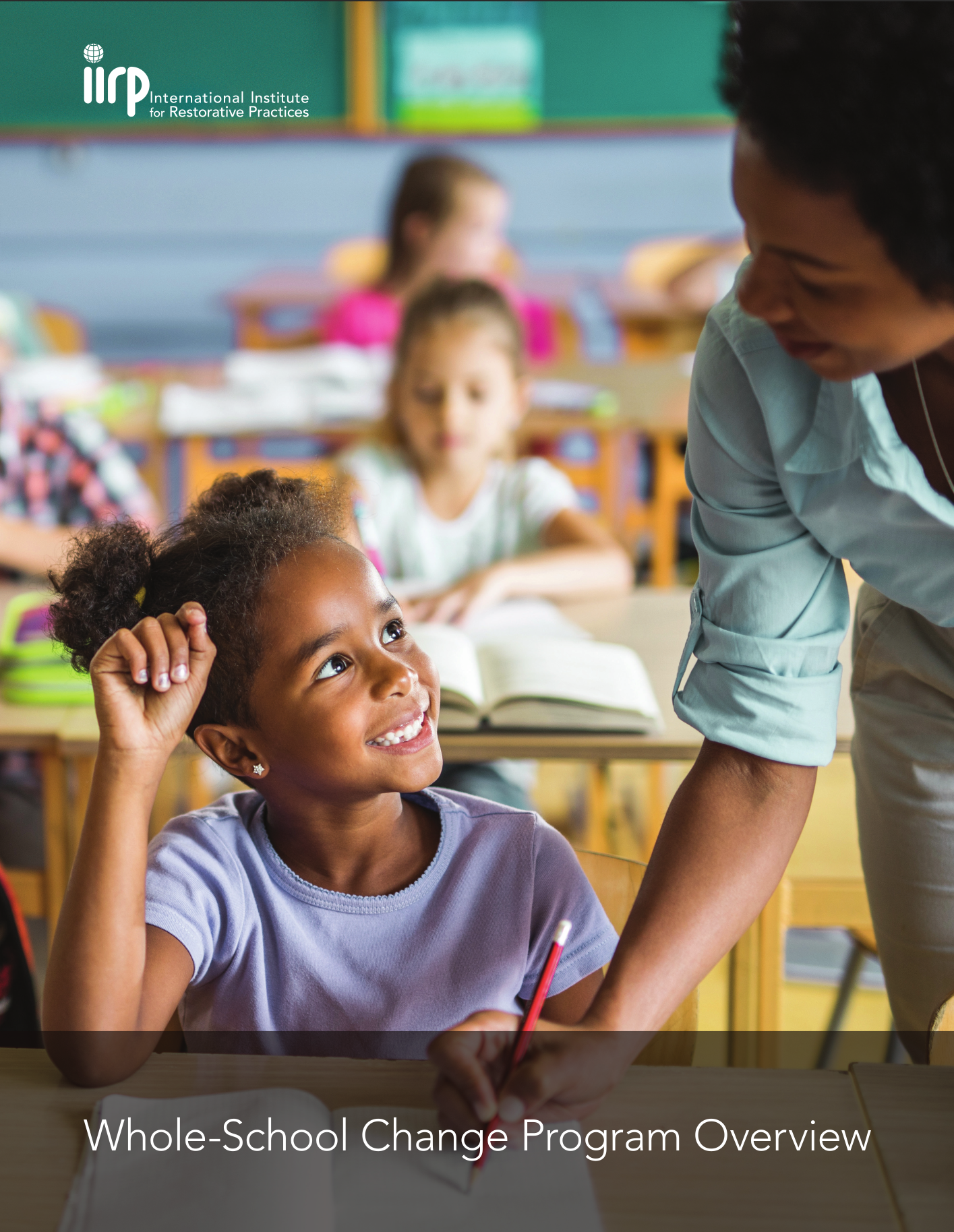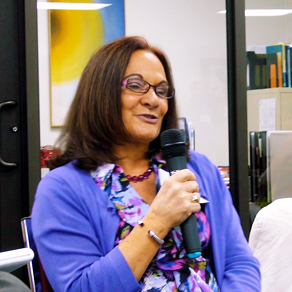Whole-School Change: Cultivating School Communities that Thrive

Positive School Culture
Whole-School Change (formerly SaferSanerSchools) is a program that cultivates stronger relationships between students and staff to create a more positive school climate and communities that thrive.
Increased Engagement
Restorative practices support students, staff, administration, and parents to feel welcomed and accepted, which will contribute to a sense of belonging that can lead to an increase in student attendance and staff retention.
Multi-tiered Approach to Implementation
Our implementation process accounts for the stratification of responsibility across the school community. Staff receive appropriate guidance based on their positions and the populations they are responsible for to mitigate initiative fatigue and burnout.
Program Components
The International Institute for Restorative Practices (IIRP) Whole-School Change program provides a comprehensive implementation model that works with educators to transform school climate in districts across the United States.
Professional Development

Staff learn skills to proactively connect with students and respond when things go wrong.
Coaching

Our IIRP Coaches have robust professional backgrounds, and the strengths needed to guide school leadership toward the successful and sustainable implementation of restorative practices.
Restorative Practices Trainers

Expand and sustain the impact through our Train the Trainer model to build additional in-house expertise.
Graduate Certificates & Degrees
Dive deeper into the restorative practices field through graduate level certificates and degrees.
"Restorative practices provide a structure that builds community among students and staff and provides a way for students to restore themselves to the community following misconduct."
Anthony Hamlet
Former Superintendent, Pittsburgh Public Schools
Research and Reports
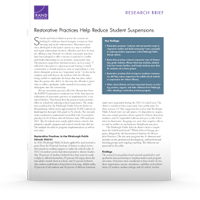 Restorative Practices Help Reduce Student Suspensions
Restorative Practices Help Reduce Student Suspensions
RAND Corporation, a Randomized Controlled Trial of Whole-School Change (formerly SaferSanerSchools as referenced in the report)
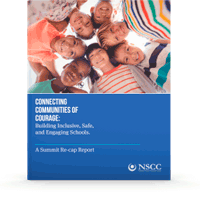 Connecting Communities of Courage: Building Inclusive, Safe and Engaging Schools
Connecting Communities of Courage: Building Inclusive, Safe and Engaging Schools
National School Climate Center
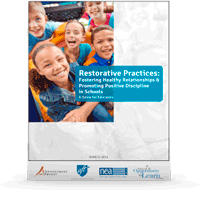 Restorative Practices: Fostering Healthy Relationships & Promoting Positive School Discipline
Restorative Practices: Fostering Healthy Relationships & Promoting Positive School Discipline
Advancement Project, American Federation of Teachers, National Education Association, Opportunity to Learn Campaign
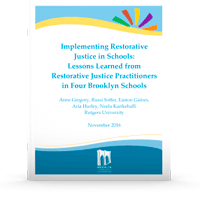 Implementing restorative justice in schools: Lessons learned from restorative justice practitioners in four Brooklyn schools
Implementing restorative justice in schools: Lessons learned from restorative justice practitioners in four Brooklyn schools
Anne Gregory, Ph.D., et al., Rutgers University
Frequently Asked Questions
What is the program timeline?
Our program works with all school-based staff and ensures that all elements are in place for success. The program takes two to three years from planning to full implementation on the following approximate timeline:
Planning (3-6 months)
Baseline readiness is assessed through discussions and questionnaires to gauge perceptions of the quality of relationships between faculty, students and staff. Existing policies and procedures, strategic plans and school climate data are used to develop a plan that fits the needs of the school or district to improve overall climate.
Program launch and Year 1 implementation
All staff first receive professional development from skilled instructors, who are also practitioners themselves. As staff begin to implement the skills learned, IIRP coaches support staff through observation and performance review and answer questions that arise. Staff also form professional learning communities (PLCs) to help foster a culture of support and ongoing professional learning.
Annual assessment and Year 2 implementation
At the end of Year 1, surveys may be used to assess progress made toward competency development, skill proficiency, perception of school and work climate, satisfaction with IIRP coaching and other indicators of good implementation. PLCs and coaching continue, supplemented by advanced professional development offerings throughout Year 2.
Final assessment and sustaining the program
Post-program questionnaires for school-based staff may be used to assess culture change. Indicators include staff understanding and commitment to continue using restorative practices. The IIRP helps leaders develop a sustainability plan. Districts and schools may choose to maintain a relationship with the IIRP for additional coaching and professional development.
What skills and competencies will educators learn?
The fundamental hypothesis of restorative practices is that people are happier, more productive and cooperative, and more likely to make positive changes when those in authority do things with them rather than to them or for them. The essential elements and competencies taught in the Whole-School Change program help make this hypothesis a tangible reality.
Essential elements of restorative practices
Within two years of continual implementation, staff will consistently understand and use the following essential elements of restorative practices:
- Affective Statements
- Restorative Questions
- Small Impromptu Conversations
- Proactive Circles
- Responsive Circles
- Restorative Conferences
- Fair Process
- Reintegrative Management of Shame
Educational competencies
The essential elements help staff strengthen key educational competencies* that support a restorative school climate and culture:
- Compassion – support the academic and social-emotional needs of students
- Conflict Management – quickly resolve conflicts and repair harm through a range of restorative interventions
- Courage – deal with others directly and fairly by providing honest and constructive feedback
- Integrity and Trust – engage in honest self-reflection, including vulnerability and self-awareness
- Interpersonal Skills – build positive and active relationships with students, families and colleagues
- Listening – use restorative dialogue and questions, while being an attentive, active listener, to foster student voice
- Valuing Diversity – foster a climate of inclusion, with equitable and fair treatment of all students
* Selected from educational competencies compiled by Microsoft Education.
What professional development is part of the Whole-School Change program?
All staff begin by attending one two-day event:
- Restorative Practices for Educators - teaches fundamental theory and practices for engaging with students, staff and parents in your school setting
Selected staff attend our two-day event:
- Restorative Justice Conferencing - teaches how to facilitate a formal, scripted circle process to address racial incidents, bullying, vandalism and other serious infractions
We also offer advanced trainings, including:
- Restorative Leadership Development: Authority with Grace - provides school leaders with a framework for advancing their vision while fully engaging staff
- Restorative Responses to Adversity & Trauma - teaches techniques for working with children and families with challenging backgrounds and facing difficult circumstances
- Aggression Replacement Training® - teaches an intervention for aggressive adolescents and children consistent with the restorative practices framework
- Motivational Interviewing - teaches a collaborative, research-based dialogue process that strengthens the motivation for change in students you support
During the Whole-School Change program, the IIRP typically sends instructors to your school or district to conduct professional development on site. Smaller schools or districts may choose to save costs by sending select cohorts to our public offerings. Read more details about our professional development events.
All events are presented as full 8-hour days of professional development (6 hours of instruction, 2 hours for registration, lunch and breaks).
How does restorative practices align with other school climate initiatives?
Restorative practices complements other programs, including SEL (social and emotional learning) and PBIS (Positive Behavioral Interventions and Supports). In fact, many educators find that restorative practices provides practical approaches that help them more fully implement other programs.
When implemented in conjunction with elementary or middle school SEL programs, restorative practices provides a powerful framework for building competencies and sustaining healthy relationships. The IIRP’s Whole-School Change program creates time, space and structure for students and adults to recognize, process and express emotions. Together, restorative practices and SEL improve school climate and culture by increasing pro-social interaction and decreasing physically or emotionally unsafe behavior, offering real-life benefits for students.
Restorative practices also aligns with MTSS (multi-tiered system of supports) approaches, such as PBIS. The IIRP instructs educators to use proactive approaches 80 percent of the time (Tier 1) to strengthen relationships and build community before harm has occurred. When used preventatively, restorative responses tend to be needed just 20 percent of the time for addressing harm and holding students accountable. Processes such as circles, impromptu conversations and formal conferences can be used to respond to minor incidents (Tier 2) as well as more serious ones (Tier 3). This approach can impact students with disabilities and other marginalized groups.
What does the program cost? Are grants available?
The cost of the Whole-School Change program varies depending on the size of the district or school and the overall number of people who will be trained.
The are no grants to pay for the program available through the IIRP. However, we can provide useful information for schools and districts who are seeking outside grant funding.
Please contact us for detailed information about pricing.
What are the qualifications of the IIRP?
Since its founding in 2000, the IIRP has been coaching schools to implement restorative practices school-wide. In 2011 the IIRP became an accredited graduate school, offering a Master of Science and a Graduate Certificate in Restorative Practices. Our instructors include current and former superintendents, principals, educators and leaders in organizational change. Each year, the IIRP provides professional development events to thousands of participants in the United States and around the world.
National recognition and partnerships
Most national education associations, agencies and membership organizations, including the National Education Association (NEA), American Federation of Teachers (AFT), National Association for the Advancement of Colored People (NAACP), International Bullying Prevention Association (IBPA) and the National Association of Community and Restorative Justice (NACRJ), recognize restorative practices as a promising approach to building positive school climate.
Since 2015, the IIRP has conducted pilot projects to align best practices in K-12 with national educators in Positive Behavioral Interventions and Supports (PBIS), The Collaborative for Academic, Social, and Emotional Learning (CASEL), Center for Safe Schools (Olweus Bullying Prevention Program), National School Climate Center (NSCC) and Committee for Children (CFC).
We work with schools nationwide
School districts we have worked with include:
Baltimore City Schools, MD
Canton City Schools, OH
Cleveland Metropolitan School District, OH
Columbus City School District, OH
District 49, Colorado Springs, CO
Durham Public Schools, NC
Fontana Unified School District, CA
Forest Hills Public School District, MI
Jefferson County Public Schools, KY
Heartland Lakeside School District, WI
Miami-Dade County Public Schools, FL
Philadelphia Public Schools, PA
Pinellas School District, FL
Pittsburgh Public Schools, PA
Snoqualmie Valley School District, WA
Wichita Public Schools
We also work with public, parochial, independent and charter schools across the U.S. Call for references.
Contact Us
Have questions about Whole-School Change? We're here to help. Our offices are open Monday through Friday, 8:00 a.m. to 4:30 p.m. Eastern.
Schedule a time to talk »
Phone: 610-807-9221
